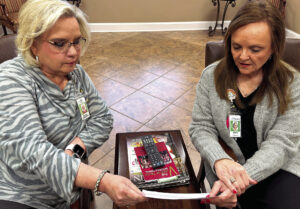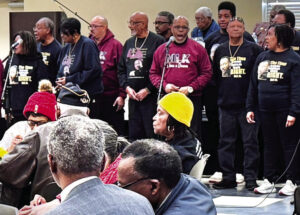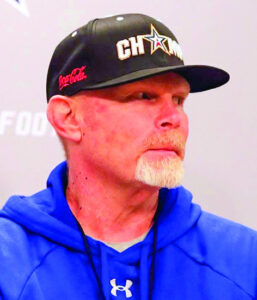Faith, family and resilience are keys to cancer survival
PHIL CAMPBELL — Ten years ago, Melissa Stancil faced a diagnosis that changed her life.
Today, she’s not only a survivor of Stage 3 breast cancer but also as a first-grade teacher, wife, mother and grandmother, and more determined than ever to keep moving forward.
Stancil, who teaches at Phil Campbell Elementary School, marked the 10-year anniversary of her surgery this year.
Next spring will bring another milestone: a decade since completing treatment and the chance to finally come off her post-cancer medicine.
Her journey began in July 2015 when she was diagnosed with invasive lobular carcinoma.
A mammogram just a month earlier looked normal.
Around that time, she discovered a knot under her arm. An ultrasound revealed more, leading doctors to order molecular imaging — a detailed scan similar to a mammogram but with a longer time per view.
That’s when they found the truth — three tumors.
“I found a knot, and that made all the difference,” Stancil recalled. “It’s important to do your self-checks, because you know your body. If you notice anything abnormal, it’s important to go and have it checked.”
Her doctors recommended removing the breast with the three tumors. The other side, they explained, showed changes that carried about a 20% chance of developing cancer in the future.
Stancil decided to have both breasts removed.
“I didn’t want to have to go through surgery and treatment twice,” she said.
The diagnosis was Stage 3, which meant chemotherapy and radiation would follow.
She went through two rounds of chemo beginning that fall and endured 35 radiation treatments over seven weeks.
“My mom had it too, but she was older when she was diagnosed. Three of my first cousins on her side also had breast cancer. One of them didn’t survive.”
That family history made her vigilant about annual mammograms.
“I trusted the mammograms over the years, but it makes you wonder: Could it have been caught earlier if I’d had other tests?” she asked.
Lobular carcinoma doesn’t always show up on a mammogram. In her case, it didn’t — it was the ultrasound that revealed the cancer.
The year before, Stancil’s doctor had even referred her to a surgeon for a possible biopsy, but the surgeon decided it wasn’t needed.
“I trusted that,” she recalled.
Looking back, she wonders whether more aggressive testing such as a MRI might have caught the cancer sooner, especially given her family history.
MELISSA STANCIL
After the diagnosis she leaned on her mother’s advice: Stay positive and trust God to get you through. That guidance carried her through difficult months of treatment.
Stancil also had to take a year-long leave from teaching, partly because of her multiple sclerosis, diagnosed in 2010.
With a low whiteblood- cell count, a weakened immune system and the added fatigue from chemo, her doctors advised her to step away.
It wasn’t an easy decision, but she trusted their guidance.
“Fatigue is a big thing with MS,” she said. “Then with the chemo added to that, they just felt it was best to take off.”
Having a daughter and two sisters living in Birmingham helped her choose UAB’s Kirklin Clinic for treatment.
“My husband got help from them [family members] with taking me to treatment, which made things easier.”
She said the medical teams who treated her made a lasting impact.
“The nurses at the cancer clinic where I had chemo were wonderful,” she said. “When I had radiation closer to home in Decatur, they were just as caring.”
She also drew strength from her school community. Co-workers brought meals, organized a money tree at Christmas, and even surprised her one evening by arriving on a school bus to sing carols at her home.
“They were always doing something to remind me I wasn’t forgotten,” she said.
When she returned to the classroom, she brought a new perspective.
“Even on the rough days now, I remind myself it could always be worse. I’m not in the hospital; I’m not going through chemo. That makes me more thankful for every day.”
Her health struggles also gave her deeper compassion.
“You never know what someone else is going through,” she said. “If a child is having a bad day or a coworker seems upset, you don’t know what they may be dealing with. That changes the way you see people.”
Through it all, her greatest motivation was the hope of one day having grandchildren.
“That was something I always wanted to experience,” she said.
Now she has three grandsons and a new granddaughter born earlier this month. One rides with her each day to Phil Campbell Elementary, where he’s in kindergarten, while another, the same age, attends her daughter’s school in Muscle Shoals.
Her youngest grandson will turn 4 in November.
When Stancil was diagnosed, her son-in-law had just begun pharmacy school in Birmingham after recently getting married, and her son, Matthew, was starting his senior year in high school.
Stancil also has a daughter, Caitlin, and a new granddaughter, born earlier this month.
“It’s exciting to see them raising their families,” she said. Her love of family also carries into her classroom.
“I enjoy watching the kids come in not reading well and then seeing how much they learn and grow,” she said. “The joy of learning in their eyes — that’s what keeps me going.”
This is her 21st year teaching. She grew up in Phil Campbell, where her family moved after her father was injured in a construction accident.
Stancil said the effects of her cancer treatment still shape her life.
“Chemo can affect your body years down the road, so I have to keep up with checkups,” she said. “I see a heart specialist, a dermatologist and have regular lab work.”
Her post-cancer medicine could cause osteoporosis, but has causted osteopedia, so she now receives Prolia injections and regular bone scans.
To her, follow-ups are part of staying vigilant. She currently goes to the City of Hope Cancer Center in Georgia, where she has yearly scans and biannual lab work.
Next spring, when she comes off her postcancer medicine, she’ll also carry a reminder of what she saw during treatment.
“Cancer doesn’t care how old you are,” she said. “When I was in treatment, there were women younger than me going through it.”
It’s a reminder she hopes others will take to heart.
“Even if you haven’t started mammograms yet, you should never ignore changes. If you find a knot or notice something unusual, get it checked.”
She admitted the milestone carries mixed feelings.
“You kind of want to forget the cancer,” Stancil said. “But you don’t forget how far you’ve come. I still have reminders because of the mastectomy. Those dates stay with you.”
If someone newly diagnosed would ask her for advice, Stancil said her answer would be simple: “Stay positive and have faith.”
“Cling to God, because I truly believe that’s what got me through,” she said. “There were days I look back and wonder, how did I do that?”
She also urged others not to be afraid to lean on family and friends.
“I was always the type who liked to do everything myself,” she said. “But when I was going through treatment, my sisters and brothers all pitched in. It’s important to accept help when you need it.
“Ten years later, I’m just thankful to be here — teaching, surrounded by family, and watching my grandkids grow.”






